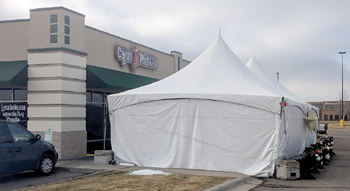Are small business owners losing hope?
The latest survey of their membership from the National Federation of Independent Business (NFIB) indicate that they are, according to a recent release from Montana NFIB Director Ronda Wiggers. “This latest report shows that Main Street businesses are losing hope,” said Wiggers.
NFIB’s Small Business Economic Trends reports that in its monthly Optimism Index, nine of the 10 Optimism Index components declined and only one improved. Owners expecting better business conditions over the next six months declined 24 points to a net negative 16%.
NFIB chief economist Bill Dunkelberg said, “This month’s drop in small business optimism is historically very large, and most of the decline was due to the outlook of sales and business conditions in 2021. Small businesses are concerned about potential new economic policy in the new administration and the increased spread of COVID-19 that is causing renewed government-mandated business closures across the nation.”
The state director for Montana’s leading small-business association suggested that one thing the State Legislature could do to help ameliorate the grim news is pass legislation that will provide liability protections for small businesses. “The recently opened second round of Paycheck Protection Program loans will help, but states can do their part by alleviating the worries of higher taxes and more regulations, and, as Senate Bill 65 seeks to do in Montana, provide some liability protection from frivolous lawsuits,” said Wiggers.
An earlier survey of Montana NFIB members revealed that 96.8 percent of small business owners said protection from lawsuits due to COVID-19 should be a top legislative priority. NFIB regularly surveys membership regarding policies and business trends. The organization is unique among business organizations in that only business owners are allowed to determine policies and respond to surveys.
Wiggers explained they are concerned about frivolous lawsuits putting more businesses out of business. It doesn’t matter if a business prevails in any court proceedings, just the legal costs of the process and the distraction away from managing their business is enough, to put out of business, businesses already weakened by COVID restrictions. “It isn’t about winning or losing, you can’t afford a retainer fee to get an attorney,” she said.
Wiggers noted that in that earlier survey one out of four businesses said they would not make it for six more months if the COVID shutdowns continued.
Given the second round of PPP loans being made available by Congress, “We are expecting about half of businesses will take advantage of PPP loans. Montana businesses and lenders participated pretty heavily in the first round.”
Wiggers said that during the state legislature she will primarily be monitoring the bills in a “defensive mode” – opposing those that appear harmful to Montana business. She will be tracking about 200 bills.
In following NFIB membership-set policy they hope to see the business equipment tax reduced or totally eliminated. They will oppose any family-leave legislation, the addition of more regulations on businesses, and hope to see some beneficial tax changes.
Wiggers said that 71.9 percent of NFIB members in their surveys have said they oppose local option taxes.
The NFIB Research Center has collected Small Business Economic Trends data with quarterly surveys since the 4th quarter of 1973 and monthly surveys since 1986. Survey respondents are drawn from a random sample of NFIB’s membership. The report is released on the second Tuesday of each month. This survey was conducted in December 2020. For more information about NFIB, please visit NFIB.com.
The SBET’s primary value is anticipating short-run fluctuations in economic activity. An additional value of the SBET is its measurement of small business activities and concerns over time. The benefit of a longitudinal data set offers an invaluable perspective on how policies and business cycles impact small businesses over time. The SBET is one of the few archival data sets on small business, particularly when research questions address business operations rather than opinions. Today, it’s the largest, longest-running data set on small business economic conditions available.


0 comments